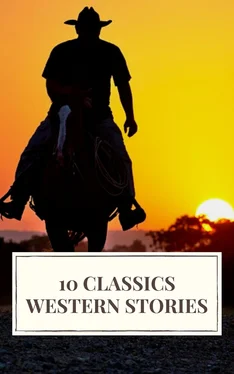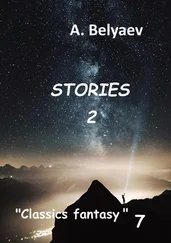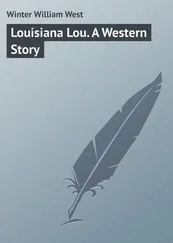For the hardest part of it all was that he sacrificed her as well as himself.
“It must be,” he thought; “I must give her up. I will go now and tell her; then I will never look upon her face again. But oh! what will become of her?”
And his long fingers were clinched as in acutest pain. But his sensitive nerves, his intense susceptibilities were held in abeyance by a will that, once roused, was strong even unto death.
He went out. It was dark. Away to the east Mount Hood lifted its blazing crater into the heavens like a gigantic torch, and the roar of the eruption came deep and hoarse through the stillness of night. Once, twice it seemed to Cecil that the ground trembled slightly under his feet. The Indians were huddled in groups watching the burning crest of the volcano. As the far-off flickering light fell on their faces, it showed them to be full of abject fear.
“It is like the end of the world,” thought Cecil. “Would that it were; then she and I might die together.”
He left the camp and took the trail through the wood to the trysting-place; for, late as it was, he knew that she awaited him.
There is not one upon life’s weariest way,
Who is weary as I am weary of all but death.
Swinburne.
The grim sentinels by the pathway, who had been so reluctant to let Cecil pass the day before, were still more reluctant this evening. One of them planted himself in the trail directly in front of Cecil, and did not offer to let him go on, but stood sullenly blocking the way. Cecil touched the warrior’s arm and bade him stand aside. For an instant it seemed that he would refuse, but his superstitious respect for the white tomanowos overcame his obstinacy,—and he stepped unwillingly back.
But as Cecil went on he felt, and felt rightly, that they would not let him pass again,—that the last act, be it what it might, in his love drama, was drawing to a close.
A few moments’ walk, and he saw in the dark the little figure awaiting him under the trees. She came slowly forward to meet him. He saw that her face was very pale, her eyes large and full of woe. She gave him her hands; they felt like ice. He bent over her and kissed her with quivering lips.
“Poor child,” he said, putting his arms around her slender form and drawing it close in his embrace, “how can I ever tell you what I have to tell you to-night!”
She did not respond to his caress. At length, looking up in a lifeless, stricken way, she spoke in a mechanical voice, a voice that did not sound like her own,—
“I know it already. My father came and told me that to-morrow I must—” She shuddered; her voice broke; then she threw her arms around his neck and clung to him passionately. “But they can never tear me away from you; never, never!”
How could he tell her that he came to put her away from him, that he came to bid her farewell? He clasped her the tighter in his arms. For an instant his mind swept all the chances of flight with her, only to realize their utter hopelessness; then he remembered that even to think of such a thing was treachery to the resolves he had just made. He shook from head to foot with stormy emotion.
She lifted her head from his breast, where it was pillowed.
“Let us get horses or a canoe, and fly to-night to the desert or the sea,—anywhere, anywhere, only to be away from here! Let us take the trail you came on, and find our way to your people.”
“Alas,” replied Cecil, “how could we escape? Every tribe, far and near, is tributary to your father. The runners would rouse them as soon as we were missed. The swiftest riders would be on our trail; ambuscades would lurk for us in every thicket; we could never escape; and even if we should, a whole continent swarming with wild tribes lies between us and my land.”
She looked at him in anguish, with dim eyes, and her arms slipped from around his neck.
“Do you no longer love Wallulah? Something tells me that you would not wish to fly with me, even if we could escape. There is something you have not told me.”
Clasping her closely to him, he told her how he felt it was the will of God that they must part. God had sent him on a sacred mission, and he dared not turn aside. Either her love or the redemption of the tribes of the Wauna must be given up; and for their sake love must be sacrificed.
“To-day God took away the words from my lips and the spirit from my heart. My soul was lead. I felt like one accursed. Then it came to me that it was because I turned aside from my mission to love you. We must part. Our ways diverge. I must walk my own pathway alone wheresoever it leads me. God commands, and I must obey.”
The old rapt look came back, the old set, determined expression which showed that that delicate organization could grow as strong as granite in its power to endure.
Wallulah shrank away from him, and strove to free herself from his embrace.
“Let me go,” she said, in a low, stifled tone. “Oh, if I could only die!”
But he held her close, almost crushing the delicate form against his breast. She felt his heart beat deeply and painfully against her own, and in some way it came to her that every throb was agony, that he was in the extremity of mental and physical suffering.
“God help me!” he said; “how can I give you up?”
She realized by woman’s intuition that his whole soul was wrung with pain, with an agony darker and bitterer than her own; and the exceeding greatness of his suffering gave her strength. A sudden revulsion of feeling affected her. She looked up at him with infinite tenderness.
“I wish I could take all the pain away from you and bear it myself.”
“It is God’s will; we must submit to it.”
“His will!” Her voice was full of rebellion. “Why does he give us such bitter suffering? Doesn’t he care? I thought once that God was good, but it is all dark now.”
“Hush, you must not think so. After all, it will be only a little while till we meet in heaven, and there no one can take you from me.”
“Heaven is so far off. The present is all that I can see, and it is as black as death. Death! it would be sweet to die now with your arms around me; but to live year after year with him! How can I go to him, now that I have known you? How can I bear his presence, his touch?”
She shuddered there in Cecil’s arms. All her being shrunk in repugnance at the thought of Snoqualmie.
“Thank God for death!” said Cecil, brokenly.
“It is so long to wait,” she murmured, “and I am so young and strong.”
His kisses fell on cheek and brow. She drew down his head and put her cheek against his and clung to him as if she would never let him go.
It was a strange scene, the mournful parting of the lovers in the gloom of the forest and the night. To the east, through the black net-work of leaves and branches, a dull red glow marked the crater of Mount Hood, and its intermittent roar came to them through the silence. It was a night of mystery and horror,—a fitting night for their tragedy of love and woe. The gloom and terror of their surroundings seemed to throw a supernatural shadow over their farewell.
“The burning mountain is angry to-night,” said Wallulah, at last. “Would that it might cover us up with its ashes and stones, as the Indians say it once did two lovers back in the old time.”
“Alas, death never comes to those who wish for it. When the grace and sweetness are all fled from our lives, and we would be glad to lie down in the grave and be at rest, then it is that we must go on living. Now I must go. The longer we delay our parting the harder it will be.”
“Not yet, not yet!” cried Wallulah. “Think how long I must be alone,—always alone until I die.”
Читать дальше












